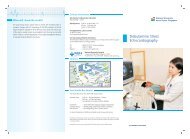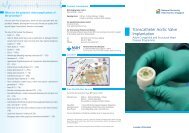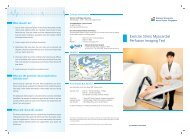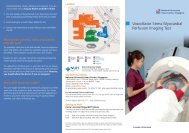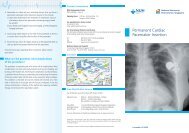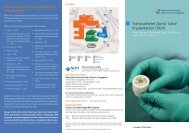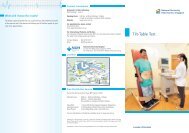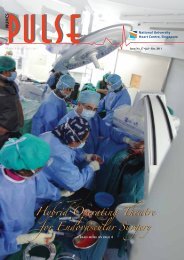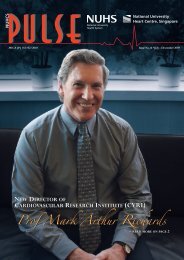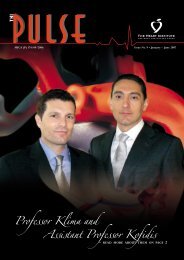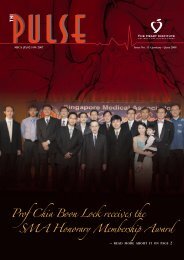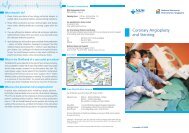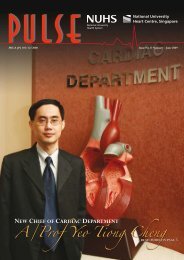Treadmill Exercise Stress Electrocardiography Test - nuhcs
Treadmill Exercise Stress Electrocardiography Test - nuhcs
Treadmill Exercise Stress Electrocardiography Test - nuhcs
You also want an ePaper? Increase the reach of your titles
YUMPU automatically turns print PDFs into web optimized ePapers that Google loves.
When will I know the results?<br />
The doctor supervising the test can usually tell you the preliminary results<br />
of the exercise test. Your doctor will inform you of the final report at your<br />
next clinic appointment.<br />
Contact information<br />
Non-Invasive Cardiovascular Laboratory<br />
Main Building 1, Level 1<br />
Opening Hours: 8.30 am - 6.00 pm (Mon - Fri)<br />
8:30 am - 12:00 noon (Sat)<br />
(except on Public Holidays)<br />
For appointments, please contact<br />
Tel: (65) 6772 2002<br />
Email: appointment@nuh.com.sg<br />
For International Patients And Visitors<br />
The International Patients Liaison Centre (IPLC) is a one-stop service centre to support<br />
all the medical needs of our foreign patients<br />
Tel<br />
: (65) 6779 2777 (24-Hours Helpline)<br />
Fax : (65) 6777 8065<br />
Website : www.nuh.com.sg/iplc.html<br />
Location<br />
National University Hospital<br />
5 Lower Kent Ridge Road, Singapore 119074<br />
Tel: 6779 5555 Fax: 6779 5678 Website: www.nuh.com.sg<br />
<strong>Treadmill</strong> <strong>Exercise</strong> <strong>Stress</strong><br />
<strong>Electrocardiography</strong> <strong>Test</strong><br />
Free Shuttle Bus Service<br />
Free Shuttle Bus Service from Dover MRT Station to NUH<br />
Operation hours<br />
Dover/NUH<br />
passenger pickup/<br />
drop off point<br />
: 8.00 am – 8.30 pm (Mondays – Fridays)<br />
8.00 am – 2.00 pm (Saturdays)<br />
Not available on Sundays and Public Holidays<br />
: 1. Dover MRT Station (opposite Singapore Polytechnic)<br />
2. Main Building, Lobby Entrance (near roundabout)<br />
3. Kent Ridge Wing, Level 3, South Entrance<br />
For more information on Shuttle Bus schedule, log on to www.nuh.com.sg<br />
Information in this brochure is given as a guide only and does not replace medical advice from your<br />
doctor. Please seek the advice of your doctor if you have any questions related to the surgery, your health<br />
or medical condition.<br />
Information is correct at time of printing (Jan 2010) and subject to revision without notice.
What is treadmill exercise stress<br />
electrocardiography (ECG) test?<br />
Blood vessels supplying the heart with blood (also called coronary arteries)<br />
can be abnormally narrowed by a process called atherosclerosis. When this<br />
happens, the blood flow to the heart may be insufficient during exercise.<br />
This is called angina pectoris. Angina pectoris is often a prelude to a heart<br />
attack. It is therefore important to subject patients to physical stress under<br />
specially controlled conditions to determine if they experience angina<br />
pectoris. This is the purpose of a stress test.<br />
<strong>Treadmill</strong> exercise is one of the most common forms of stress employed in<br />
the laboratory to stress the heart. During the treadmill exercise, the level<br />
of exercise gradually increases until the patient becomes tired or develops<br />
symptoms. The adequacy of exercise is determined by the patient reaching<br />
a certain target heart rate. This heart rate differs for each person according<br />
to age. The blood pressure, the patient’s symptoms and ECG are monitored<br />
during the test. When the heart receives insufficient blood supply, certain<br />
changes occur in the ECG, and the blood pressure may be reduced. The<br />
patient may also experience angina pectoris and shortness of breath.<br />
What is the purpose of this test?<br />
This test is most commonly performed to determine if the patient has<br />
evidence of atherosclerotic heart disease. The exercise stress ECG test may<br />
also be performed for other reasons, such as to determine a person’s exercise<br />
capacity, detect exercise-induced heart rhythm abnormalities, assess blood<br />
pressure response to exercise and so on.<br />
What can I expect?<br />
The test is performed in the Non-Invasive Cardiac Laboratory. Before the<br />
test, you will be required to sign a consent form after the doctor has<br />
explained the test to you. Male patients will be asked to remove their shirts<br />
to facilitate the attachment of ECG wires to the chest. Women may be asked<br />
to change into special gowns for this purpose. The technologist will<br />
demonstrate to you how to walk safely on the treadmill machine. Before<br />
performing the exercise, your blood pressure and a baseline ECG will be<br />
recorded. You will also be asked to hyperventilate (breathe deeply and<br />
rapidly) for about a minute to determine the effect of hyperventilation on<br />
your ECG. You will then proceed with the exercise. Most commonly, the<br />
speed and incline of the machine will increase every 3 minutes. The<br />
technologist will inform you when the next stage is due. Throughout the<br />
test, your ECG and blood pressure will be monitored and you will be asked<br />
to report any symptoms. If you experience any symptoms with the exercise,<br />
you must inform the technologist or the doctor supervising the test. The<br />
exercise test will be terminated when an adequate level of stress has been<br />
achieved, or if you experience chest pain or breathlessness. You will continue<br />
to be monitored for a few minutes during the recovery period, after which<br />
the test will end.<br />
What should I do?<br />
1. Avoid heavy meals for at least 2 hours before the test. Come in sports<br />
attire to facilitate the test.<br />
2. Medications that slow down the heart rate, such as atenolol and<br />
diltiazem, should be omitted 24 to 48 hours prior to the test. Please<br />
check with your doctor about this.<br />
3. Inform your doctor if you have conditions that make exercise difficult,<br />
such as backaches. Also, exercise test should not be performed if you<br />
have fever, viral and other accompanying acute illnesses. Please check<br />
with your doctor.<br />
What are the potential risks/complications with<br />
this test?<br />
<strong>Exercise</strong> testing is generally very safe and tolerable. Most complications<br />
are minor. These include injuries sustained from falling from the treadmill<br />
machine. Very rarely a heart rhythm abnormality or heart attack may occur<br />
during exercise, necessitating resuscitation and hospitalisation. However,<br />
you will be closely supervised by trained medical personnel throughout<br />
the whole test.<br />
Cross section of coronary artery narrowed<br />
by a process called Atherosclerosis.<br />
Fatty deposits



